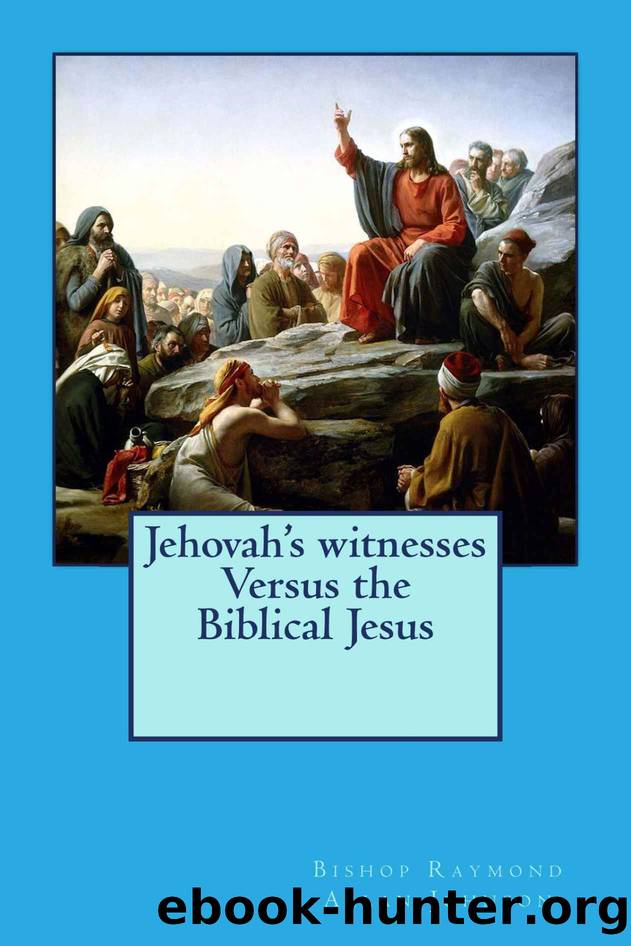Jehovah's witnesses Versus the Biblical Jesus (Leaving the Watchtower Book 4) by Johnson Bishop Raymond

Author:Johnson, Bishop Raymond [Johnson, Bishop Raymond]
Language: eng
Format: epub
Publisher: The GlobalDestiny Imprint
Published: 2016-02-22T16:00:00+00:00
Back to the beginning
Then spake Jesus to the multitude, and to his disciples, 2 Saying, The scribes and the Pharisees sit in Moses' seat: 3 All therefore whatsoever they bid you observe, that observe and do ; but do not ye after their works: for they say , and do not.
Long before Jesus appeared in the world the Jewish rabbinical leaders had concluded that the name of God – as represented in the scriptures by the Tetragrammaton – was no longer allowed to be written down, or spoken out loud, except in certain holy books and by the high priest, in the Temple, on certain ceremonial days. Without trying to delve too deeply into Jewish theology, it is said that this prohibition was codified in Jewish rabbinical literature, sometime from as early as the third century B.C. From this time onward, the Jewish people were very well aware that speaking this name of God out loud would have been considered blasphemy. Rabbi Lewis Jacobs observes,
The data regarding the prohibition of pronouncing the Tetragrammaton as it is written are complicated but the following are the main details. Philo ( Life of Moses, ii. II) observes that on the front of the High Priest’s miter were incised the four letters of the divine name which it is lawful only for the priests to utter in the Temple (in the priestly blessing) and for no one else, to utter anywhere.
The [midrash] Sifre (Numbers 43) similarly states that in the Temple the priestly blessing was given with the pronunciation of the special name ( Shem Ha- Meforash ) but outside the Temple with the substitute name (Adonai). The Mishnah ( Sotah 7: 6; Tamid 7:2) also states that that in the Temple the name was uttered as written but outside the Temple by its substitute. In another Mishnah ( Yoma 6: 2) it is stated that on Yom Kippur when the High Priest uttered the Shem Ha-Meforash the people fell on their faces and proclaimed: "Blessed be the name of His glorious kingdom forever and ever." [100]
By the time Jesus arrived on the scene the rabbinical prohibitions regarding the use of the name “YHWH” were well established. The Society's writings give the impression that it would have been a heroic thing for Jesus to do to blatantly defy the rabbinical traditions – for example that He would have blatantly used the name “YHWH”, and encouraged His disciples to do so, as well – but it is difficult to imagine that this would have been the case. Another interesting point that could be added to this discussion is that the ancient rabbis deduced from Deuteronomy 12:3-4 that it was forbidden to erase the name of God from a written document. The exception to this injunction was books deemed “holy books”, because of the specific prescriptions written in the Talmud for how these books were to be disposed of. [101] I don't want to read too much into this, but the strict rules for how manuscripts
Download
This site does not store any files on its server. We only index and link to content provided by other sites. Please contact the content providers to delete copyright contents if any and email us, we'll remove relevant links or contents immediately.
| Amish | Catholicism |
| Christian Science | Jehovah's Witness |
| Mennonite | Messianic Judaism |
| Mormonism | Orthodoxy |
| Protestantism |
Under the Banner of Heaven: A Story of Violent Faith by Jon Krakauer(1409)
The Early Centuries - Byzantium 01 by John Julius Norwich(1357)
Taken by J. C. Owens(1275)
In Spirit and Truth (In Spiritu Et Veritate Series) by Reed Zoe(1260)
The Amish by Steven M. Nolt(1250)
Play It as It Lays by Joan Didion(1206)
The Apogee - Byzantium 02 by John Julius Norwich(1159)
The Last Man in Russia by Oliver Bullough(1096)
A History of the Amish by Steven M. Nolt(978)
Tears of the Silenced: A True Crime and an American Tragedy; Severe Child Abuse and Leaving the Amish by Misty Griffin(958)
Leaving the Witness by Amber Scorah(948)
Fallen by unknow(925)
David Sedaris Diaries by David Sedaris(910)
The Angel of Forest Hill by Cindy Woodsmall(898)
The Best of Amish Cooking by Phyllis Pellman Good(881)
The Ariana Trilogy by Rachel Ann Nunes(877)
Escape by Carolyn Jessop & Laura Palmer(874)
Deep Blue by unknow(867)
Primal: A Quest for the Lost Soul of Christianity by Mark Batterson(851)
